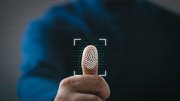Article
Are you guilty of copyright infringement?
Moving digital media downloading from the comfort of a home computer to a public access kiosk sounds easy enough. It is, if done correctly. Knowing the ins and outs of copyright law can protect you and your kiosk from costly lawsuits.
November 22, 2004
The Copyright Act is designed to protect various types of creative works, from art on the wall to books on the shelf to music on your computer. Without this protection, there is little incentive for people to generate new material. "If copyright is not protected, artistic creations won't happen," said Attorney Megan E. Gray, a Washington, D.C. lawyer specializing in intellectual property. Gray explains that basic copyright is protected by the constitution. Copyright Act is actually a collection of laws that Congress has enacted over time. The basic law does not change regardless of the media, noted Gray.
Mega music downloads
With
Surfnet Premiere, the preferred software solutions for public Internet access terminals.
|
Napster first brought the legal ramifications of music downloading to light. Gray explained that because Napster had a file sharing system, the company knew what files were on its system. Online music site Kazaa has escaped the law so far. Unlike Napster, Kazaa does not have possession of its music files. Instead they are located on the Ethernet. Kazaa can't look at what files are being copied through its system. Napster, on the other hand, knew what files were copied. Does that make Kazaa legal? Not necessarily, said Gray. The Kazaa Web site boasts that "havingKazaa is 100% legal." Like reading small print in a written contract, clicking on "important info" reveals that, "Use of the software to download copyrighted works without the permission of the copyright owner may be illegal in many jurisdictions."
"Just because it is on the Internet, it's not necessarily legal," Gray noted. Some may choose to give their work away. But if the latest music hit is offered free of charge, chances are it's a crime.
Free music is costly
Many would argue that downloading one or two songs is harmless. Big record companies can afford to lose a few dollars, right? Wrong. It's not just about the money, Gray stated. "Studios won't spend money if they won't get a return on investment." Artists whose works are diluted through multiple downloads will turn their attention to something else.
While artists and record companies protest, downloaders view file sharing as the norm. Shop.org reported that 65 percent of adults in the United States think downloading free music from the Internet will increase. Fifty-nice percent of adults don't believe it's wrong. The Web site also reported that more than half of all households in the United States with Internet access had at least one digital music file on their hard drives. More than half of that group had as many as 100 digital music files. Two-thirds of the music files were the result of file sharing. Only 17% of online adults admitted they've limited file sharing, fearing legal consequences.
Those caught breaking the copyright law often pay a hefty price. The fine for downloading one music file is $150,000, plus attorney fees. "One song could cost you $200,000," said Gray. Most people copy more than one song. Fifteen minutes spent downloading music could equal a $1 million fine. Locating law breakers is not that difficult, according to Gray. More than 10,000 people have been sued in the past year for illegally downloading music, including parents held responsible for their children's downloading activities.
Just last month, The Recording Industry Association of America (RIAA) (http://www.riaa.com) announced that Puretunes.com agreed to an out-of-court settlement for selling unauthorized music downloads. Four individuals will pay a total of $500,000 while Puretunes.com's Spanish holding company was ordered to pay $10 million to major record companies. According to an RIAA spokesperson, Puretunes.com claimed to be licensed, when in fact, it was not. Users were paying close to $25 per month for what they believed to be legal, unlimited downloads.
Thumbs down to movie pirates
Pirated blockbuster movies have also made the news. Once one copy of the latest hit movie is made available online, it's a virtual free-for-all. Like the music industry, the film industry is fighting to protect what it owns. The Motion Picture Association of America (MPAA) is preparing lawsuits against people suspected of illegally distributing movies over the Internet, according to a November 5 news release. Damages of $30,000 to $150,000 per film are being sought. The MPAA is hoping the lawsuits limit the number of illegal movie downloads. At the same time, the MPAA acknowledges that newer technology may soon cut downloading time from hours to seconds, making DVD downloads more apt to go mainstream.
Who's at fault?
When it comes to copyright infringement, finding who's at fault is not always easy. Ownership of the device used to violate copyright law comes into question. For example, Kinko's has been held liable for copyright infringement because it owned the Xerox machine used to make many copies of protected work, explained Gray. VCRs or DVD recorders, when used to tape a show for viewing later, do not violate the law. Recording a show for later viewing is considered fair use. If the devices are used to tape 1,500 copies of a program which are then sold, the law has been broken. Kiosks, if they are used to formidably assist with copyright violations, could cause legal problems for their owners. Gray noted that it can be a gray area determining who is responsible for illegal downloads, the kiosk deployer or the individual downloader.
Gray noted that an unhackable system is the holy grail of digital downloading. Downloading music, DVDs and games via kiosk or home computer saves time and money for consumers and retailers. Can a device be made truly hack free? Gray doesn't seem to think so. She cited the creation of CDs that could only be played on certain devices to protect the content from being copied. All it took was one person and a magic marker to make render the CD unprotected and available on the Internet. That's one reason very lucrative songs don't make it on Rhapsody or iTunes, Gray explained. "The risk is so high," explained Gray, "Once it's out there, it's gone."
Kiosk considerations
Consumer demand for online music and faster DVD burners are good news for kiosk developers such as BurnASong, a sister company of TouchNSurf. BurnASong kiosks are one of several kiosks on the market used for downloading music and creating customized CDs. Company president Shervin Rashti offered advice on entering this emerging market. He admitted there is a high barrier to entry. One stumbling block is obtaining licensing agreements from major record labels, a process which can take months. The labels look for credibility and technical security of both the hardware and the software. Rashti predicts market demand for kiosks that download music as well as DVDs, games and cell phone ring tones will increase. These kiosks offer retailers a much broader reach of inventory rather than being confined to the space on hand. These kiosks can be used in grocery stores, convenience stores, malls and even music stores.
In the end, when it comes to kiosks, copyright issues and digital media, Gray said her advice is to seek legal advice.
[Editor's note: Info Touch Technologies became Tio Networks in April 2006.]
 ChatGPT
ChatGPT Grok
Grok Perplexity
Perplexity Claude
Claude












